托福听力讲座题目:环境科学课
托福听力tpo51 section1 对话讲座原文+题目+答案+译文

托福听力tpo51section1对话讲座原文+题目+答案+译文Conversation1 (1)原文 (1)题目 (3)答案 (5)译文 (5)Lecture1 (7)原文 (7)题目 (9)答案 (11)译文 (11)Lecture2 (13)原文 (13)题目 (15)答案 (17)译文 (17)Conversation1原文NARRATOR:Listen to part of a conversation between a student and her biology professor.MALE PROFESSOR:So the assignment is to reproduce one of the animal camouflage experiments we read about in our text book.Which experiment did you pick?FEMALE STUDENT:Well...I was wondering if I could try to reproduce an experiment that's kinda the opposite of what was discussed in the textbook?MALE PROFESSOR:So,instead of how and why an animal might hide itself,you want to do something about why an animal might want to be seen?Hmmm.Tell me more.FEMALE STUDENT:Well,I got the idea from one of the journals you said we should look at…it's an experiment about,um,they called them eyespots in the article?MALE PROFESSOR:Eyespots,sure,the patterns on the wings of moths and butterflies that are generally believed to scare off predators because they look like big eyes.FEMALE STUDENT:Yeah,except the article was about an experiment that disputes that theory.MALE PROFESSOR:Well,we know that the markings do scare the birds,but the idea that the spots look like eyes is,well that's just a commonly held belief.FEMALE STUDENT:So—that's not even based on research?MALE PROFESSOR:Well,this whole idea of moth or butterfly markings being scary because they look like eyes rests on how we imagine that their predators—like birds —perceive the markings.And we can never really know that.All we can do is observe bird behavior.But tell me more about the experiment.FEMALE STUDENT:OK,so the experiment looked at the shapes of the markings on moth wings.The researchers wanted to know if the markings that were round or eye-shaped were more effective at deterring predators than square or rectangular markings.MALE PROFESSOR:OK…FEMALE STUDENT:Yeah.So,they attached food to paper models of moths,with different shaped marks drawn on the wings,to see how birds reacted.And what's interesting is,they realized that the round marks were not more effective at scaring birds than other shapes.MALE PROFESSOR:Were they less effective?FEMALE STUDENT:No,they were about the same...but what researchers diddetermine is that larger markings are more effective than smaller markings at scaring off prey.They called this phenomenon“visual loudness.”MALE PROFESSOR:Visual loudness,huh.Well,I guess it's not all that shocking,if you think about it.FEMALE STUDENT:So,anyway,is it OK?Can I repeat this experiment and write about it?MALE PROFESSOR:Yes,I think that'll work.The problem I foresee is,well,where? This is an urban campus...You'll have a hard time finding a good place to set up the experiment.FEMALE STUDENT:Oh,I-I wasn't planning on doing it on campus.I'm going home for spring break,and my family lives in the country,far from the nearest city.I can set it up in the backyard.MALE PROFESSOR:Good idea.Except one week is not a lot of time.So you'll need to make some adjustments to have enough data.I'd set up the experiment near a bird feeder,and get in as much observation time as you can.题目1.Why does the student talk with the professor?A.She wants permission to revise an experiment that she conducted earlier.B.She has a question about the findings of an experiment in the textbook.C.She wants to reproduce an experiment that is not in the textbook.D.She would like some advice about how to study butterfly and moth behavior.2.What does the professor say is a common assumption about certain markings onbutterfly and moth wings?A.That the markings are usually hidden from viewB.That the markings attract some kinds of birds more than othersC.That some birds perceive the markings as large eyesD.That butterflies and moths use the markings to attract mates3.What were the results of the experiment that the student describes?[Click on2 answers.]A.Birds reacted to round markings the same way they reacted to square markings.rge markings scared birds more than small markings did.C.Most birds ignored markings that looked like eyes.D.Birds were attracted to more colorful markings.4.Why does the professor mention a bird feeder?A.To suggest a strategy that may help the student carry out her task successfullyB.To recommend a place on campus that is suitable for the student's projectC.To discuss another experiment that has yielded surprising resultsD.To point out a problem in the design of the original experiment5.What can be inferred about the student when she says this:Professor:Well,we know that the markings do scare the birds but the idea that the spots looked like eyes is……well,that is just a commonly held belief.Student:So,that’s not even based on research?A.She is skeptical about what the professor just told her.B.She just realized that she designed her experiment incorrectly.C.She is worried that she misunderstood something that she read.D.She had assumed that there was scientific evidence for the theory.答案C C AB A D译文旁白:请听一段学生和其生物学教授之间的对话。
托福听力tpo66section1 对话讲座原文+题目+答案+译文
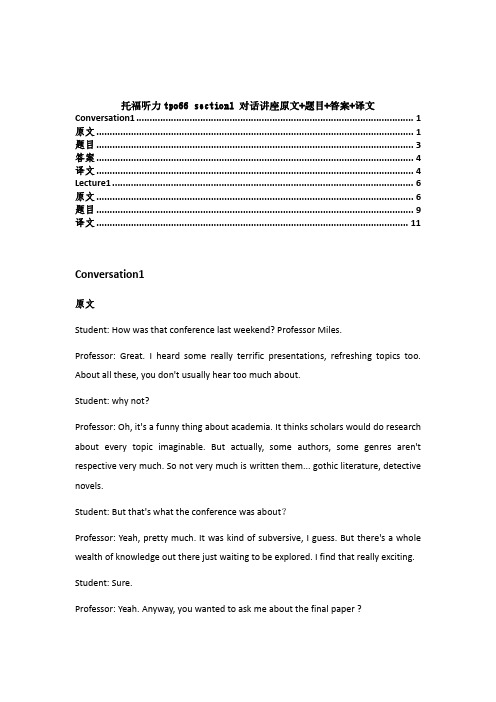
托福听力tpo66section1对话讲座原文+题目+答案+译文Conversation1 (1)原文 (1)题目 (3)答案 (4)译文 (4)Lecture1 (6)原文 (6)题目 (9)译文 (11)Conversation1原文Student:How was that conference last weekend?Professor Miles.Professor:Great.I heard some really terrific presentations,refreshing topics too. About all these,you don't usually hear too much about.Student:why not?Professor:Oh,it's a funny thing about academia.It thinks scholars would do research about every topic imaginable.But actually,some authors,some genres aren't respective very much.So not very much is written them...gothic literature,detective novels.Student:But that's what the conference was about?Professor:Yeah,pretty much.It was kind of subversive,I guess.But there's a whole wealth of knowledge out there just waiting to be explored.I find that really exciting.Student:Sure.Professor:Yeah.Anyway,you wanted to ask me about the final paper?Student:Yeah,which I see now ties into the theme of that conference,since we're supposed to write about a book from one of those lesser genres.I was wondering what about science fiction?Professor:Sure.Though it's a genre that's actually getting more and more respect within academia.There was even a talk at the conference about Jack Vance.Student:He wrote planet of adventure,right?Professor:Yeah.He's a well-researched respected science fiction writer.If you're interested in science fiction,you could look them up.That leads you to lots of other authors and lots of possibilities for your paper.Student:Great.I'm relieved you think that,that's a good genre to study.I'll find a book that interests me and do the paper on that.It seems like most people assume that science fiction is kind of like,I don't know,junk literature.Professor:Yes,a lot of people do.Student:Yeah,but I've read somethings and I think that some of it is really well written and it takes so much imagination to write SCI-Fi.Professor:Well,careful,though,there is a difference between science fiction and Scifi.Student:What do you mean?Professor:SCI fi,that's what you tend to see in films.It has all the spaceships and robots,and it focuses on exotic technology you know factor like special effects,at the expense of a well written story.I think a lot of people don't realize this and tend not to make a distinction.Student:Okay.Professor:But true science fiction is much more intellectual than that. The story is very important,and even though it might take place in an imaginary world,it might have exotic gadgets.The focus is on the plot.Science fiction creates metaphors about our world.And well what it means to be human.It's meant to getpeople to think about real things like history and human behavior.That's worthy of your time,but not SCI fi.Student:Great.Well.Can I let you know next week which book I want write about?Professor:Sure.题目1.Why does the man go to see the professor?A.To find out what the assignment is for the final paperB.To discuss a conference that the professor attendedC.To get a topic area approved for a class assignmentD.To find out the difference between science fiction and sci-fi2.What was unusual about the conference that the professor attended?A.It included presentations by many scholars who were not well known to the professor.B.It included presentations by students.C.It focused on authors who are respected by most scholars.D.It focused mostly on less popular literary genres.3.Why does the professor mention Jack Vance?[Click on2answers.]A.To encourage the man to write a paper about Planet of AdventureB.To support her point that some authors should be researched moreC.To indicate a way for the man to begin looking for a suitable topicD.To demonstrate that science fiction is gaining attention from scholars4.What is the man’s attitude toward science fiction?A.He is confident that it will become more respected.B.He disagrees with a commonly held opinion about it.C.He understands why it is not well respected.D.He is impressed that it includes exotic technology.5.According to the professor,what is a key difference between sci-fi and science fiction?A.Sci-fi is intellectually more challenging than most science fiction.B.Science fiction stories are often made into films.C.Science fiction places more importance on plot than sci-fi does.D.Science fiction makes little use of exotic technology.答案C D CD B C译文1.学生:上周末的会议如何,Miles教授?2.教授:很好,我听到了很多非常精彩的演讲,以及令人耳目一新的话题,而且这些话题平时都没机会听到。
托福听力tpo55 section1 对话讲座原文+题目+答案+译文
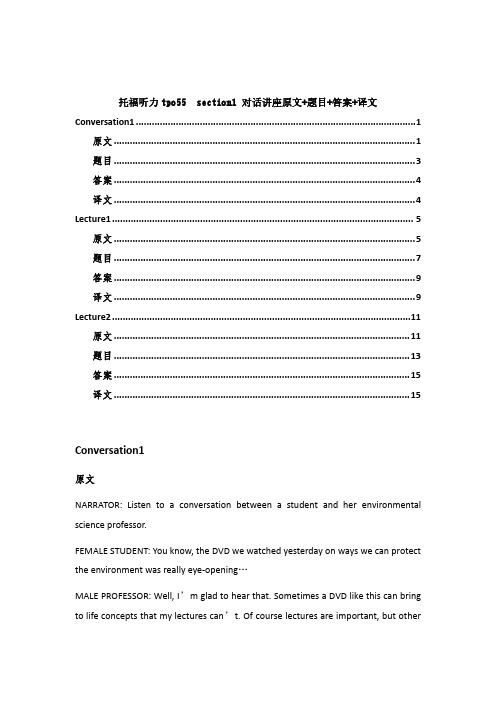
托福听力tpo55section1对话讲座原文+题目+答案+译文Conversation1 (1)原文 (1)题目 (3)答案 (4)译文 (4)Lecture1 (5)原文 (5)题目 (7)答案 (9)译文 (9)Lecture2 (11)原文 (11)题目 (13)答案 (15)译文 (15)Conversation1原文NARRATOR:Listen to a conversation between a student and her environmental science professor.FEMALE STUDENT:You know,the DVD we watched yesterday on ways we can protect the environment was really eye-opening…MALE PROFESSOR:Well,I’m glad to hear that.Sometimes a DVD like this can bring to life concepts that my lectures can’t.Of course lectures are important,but otherforms of presentation—like DVDs—help get across the concepts I want you to understand,too.FEMALE STUDENT:I agree.And the DVD got me thinking about the project you assigned.Now,I know we’re not supposed to work with anyone else for this assignment,but two of us think we have a really good idea.MALE PROFESSOR:OK,I’m listening.FEMALE STUDENT:Well,the student from class who I wanna work with—it’s Jessica Smith—you see,she has a part-time job at the hotel on campus…uh…where parents and people who are here for conferences stay?MALE PROFESSOR:Ah,yes.The environmental science department just hosted a conference not too long ago,and we had several attendees who stayed there.They really enjoyed staying at that hotel.FEMALE STUDENT:I’m sure.Jessica says it’s really nice,but it’s not so environmentally friendly.MALE PROFESSOR:Hmm…I see.Well,hotels may be reluctant to make changes to protect the environment if it could be perceived as negatively affecting the comfort of hotel guests.FEMALE STUDENT:Well,that has to do with our idea for the project.Uh…Jessica and I wanna do an assessment of the hotel and see what they can do to save energy, and create less pollution—without interfering with the positive experience of patrons.And I figured since she works there,it’d be easier for us to do the project together.Plus she already ran the idea by the hotel manager,and he’s on board with it.He was even telling her how he can use our work to apply for a grant from a local environmental foundation for money to make energy-saving upgrades and stuff!So we’d make recommendations,then he’d use our findings to make real changes.MALE PROFESSOR:That’s certainly a compelling idea—and it definitely fits within the general guidelines of the project.OK.Just give me an outline of what you plan todo,and,well,I’m a little worried.…I’ll still need you to submit the paper in the format we discussed in class,not whatever format the hotel manager might want.题目1.What is the conversation mainly about?A.A grant the student wants to apply forB.The student’s proposed plan for a class assignmentC.A project presented in a DVD the class watchedD.The student’s part-time job at a hotel2.What does the student ask the professor to allow her to do?A.Take extra time on her projectB.Write a grant rather than a paperC.Work with a partner on an assignmente her job as the focus of her project3.Why does the professor mention a science conference?A.To suggest that the student attend itB.To indicate that he is familiar with the hotelC.To state where he got information about a new discoveryD.To state where he got the video that he showed in class4.According to the conversation,why might the campus hotel managers be slow to adopt environmentally friendly policies?A.They are concerned that their customers may not be happy with the changes.B.They are not knowledgeable about the potential benefits.C.No financial help is available for reducing the initial cost of making the changes.D.They have tried to adopt such policies and found them of little use.5.What concern does the professor express?A.That the hotel manager might not allow the research to take place at the hotelB.That Jessica Smith might be too busy with her job to do the projectC.That the student’s idea for the project is overly ambitiousD.That the student might not focus on fulfilling all the requirements of the project答案B C B A D译文旁白:听一个学生和她的环境科学教授之间的对话。
最牛托福听力技巧大全

托福听力技巧一. 听力内容·分类1.Conversation(1)Office办公室A.作业内容·B.论文内容·C.课堂内容·D.实·地考察E.实·验室(2)Student service学·生服务A.课程事务B.登记注册C.图书馆D.公告栏E.食堂F.转学·G.打工H.游玩2.Lecture(1)Arts艺术类A.A rchitecture建筑B.C ity Planning城市规划C.l iterature 文学·D.Photography摄影E.Other art forms其他艺术形试a)F olk and tribal art民间和部落艺术b)C ave and rock art岩洞和石壁艺术(2)Life science生命科学·A.Biology生物学·a)Animal behavior动物行为,如:迁徙、觅食、防御行为b)Botany植物学·c)Oceanic biology海洋生物B.Environmental science环境科学·a)Climate change气候变化b)Habitats of animals and plants动植物的栖息地(3)Physical science自然科学·A.A stronomy天文学·B.G eography and geology地理地质a)G laciers, ice ages冰川、冰河纪b)S eismology: earthquakes, continental drift, volcanoes地震学·:地震、大陆漂移、火山c)Deserts and other extreme environments沙漠和其他极端环境C.C hemistry化学·(4)Social science社会科学·A.P hilosophy哲学·a)A ristotle亚里士多德b)P lato柏拉图B.p sychology 心理学·C.h istory 历史a)A rcheology 考古学·b)A rt history艺术史c)Film history电影史d)T heater History戏剧史ernment 政府E.sociology 社会学·F.economics 经济学·G.Anthropology人类学·二. 五大题型1.主旨题(1)提问方试a)What problem does the man have?b)What are the speakers mainly discussing?c)What is the main topic of the lecture?d)What is the lecture mainly about?e)What aspect of X does the professor mainly discuss?f)Why does the student visit the professor?g)Why does the student visit the registrar’s office?h)Why did the professor ask to see the student?i)W hy does the professor explain X?(2)笔记技巧无笔记,通过整体感知提炼主旨,相信第一印象(3)答题原则a)注意干扰选项特征:不精确、不相关、太宽泛、太具体b)注意对话中的一致性问题,区分内容·与目的c)注意对话双方目的不同2.细节题(1)提问方试a)According to the professor, what is one way that X can affect Y?b)According to the professor, what is the main problem with the X theory?c)What is X?d)What resulted from the invention of X?(2)笔记技巧a)六大要点:程序procedures、定义definitions、举例examples、原因和影响causes and effects(罗列不需记)、问题和回答questions and answers、赞成和反对pros and consb)多次出现的词要记c)注意否定词(3)答题原则a)注意干扰选项特征:相似表达但不完全一致、相同词汇但表达意思不同、与原文相矛盾、原文未提及b)无法确定的则选择与主题最符合的选项3.重听题(1)提问方试a)What does the professor imply when he says this?b)What is the purpose of the woman’s response?c)What can be inferred from the professor’s response to the student?d)Why does the student say this?e)What can be inferred about the student when she says this?f)What does the woman mean when she says this?(2)笔记技巧重听时无需做笔记(3)答题原则a)重听开始前先迅速扫读选项,并作出预测b)第二遍最关键c)理解说话人的真实·意图而不仅仅只是字面意思(4)习语俗语a)Tell me about it! 那还用说!(表示强烈赞同)b)You name it! 不再讨论其他的了That sort of thing, you see?To name just a few.The list goes on.c)Put it together 表示总结All in allIn a nutshelld)I don’t know about that. 表示委婉拒绝e)I think you get the picture. 你懂的。
新托福测试题及答案
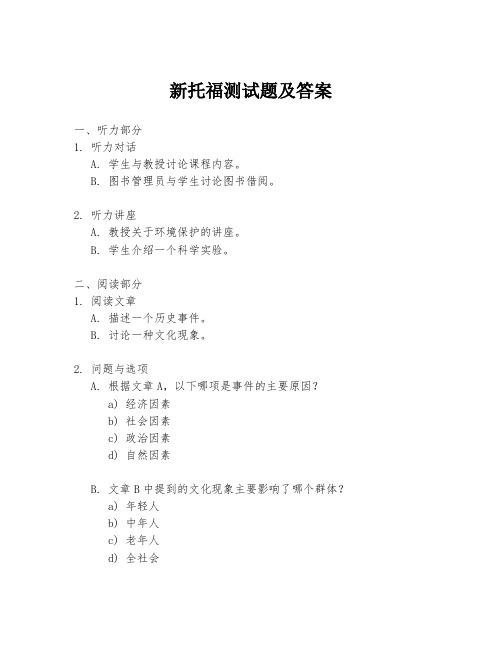
新托福测试题及答案一、听力部分1. 听力对话A. 学生与教授讨论课程内容。
B. 图书管理员与学生讨论图书借阅。
2. 听力讲座A. 教授关于环境保护的讲座。
B. 学生介绍一个科学实验。
二、阅读部分1. 阅读文章A. 描述一个历史事件。
B. 讨论一种文化现象。
2. 问题与选项A. 根据文章A,以下哪项是事件的主要原因?a) 经济因素b) 社会因素c) 政治因素d) 自然因素B. 文章B中提到的文化现象主要影响了哪个群体?a) 年轻人b) 中年人c) 老年人d) 全社会三、口语部分1. 独立口语任务A. 描述一个你曾经克服的困难。
2. 综合口语任务A. 根据听力对话和阅读文章,讨论学生如何解决遇到的问题。
四、写作部分1. 综合写作任务A. 阅读一篇文章,然后听一个相关的讲座,最后写一篇文章总结两者的主要观点和论据。
2. 独立写作任务A. 你同意以下观点吗?“教育是个人成功的关键因素”。
请给出你的理由和例子。
五、答案1. 听力部分A. 正确答案:教授建议学生阅读额外的资料来加深理解。
B. 正确答案:学生需要在一周内归还图书。
2. 阅读部分A. 正确答案:b) 社会因素B. 正确答案:a) 年轻人3. 口语部分独立口语任务答案示例:我克服的困难是学习新语言。
起初,我感到非常困难,但通过不断练习和使用语言,我最终提高了我的语言技能。
综合口语任务答案示例:学生可以通过与教授讨论问题,寻求同学的帮助,或者利用图书馆资源来解决遇到的问题。
4. 写作部分综合写作任务答案示例:文章和讲座都认为环境保护很重要,但文章强调政府的作用,而讲座强调个人的责任。
独立写作任务答案示例:我同意教育是个人成功的关键因素。
教育不仅提供了知识和技能,还培养了解决问题的能力,这对于个人的职业发展至关重要。
请注意:以上内容为示例,实际测试题和答案可能会有所不同。
托福听力tpo41 section1 对话讲座原文+题目+答案+译文
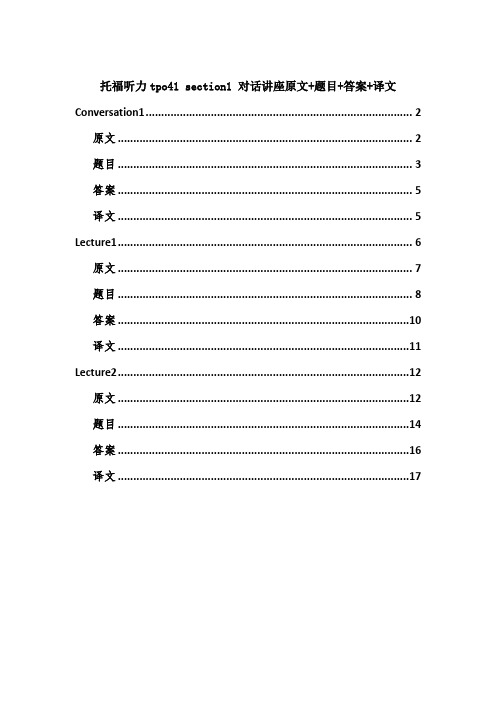
托福听力tpo41 section1 对话讲座原文+题目+答案+译文Conversation1 (2)原文 (2)题目 (3)答案 (5)译文 (5)Lecture1 (6)原文 (7)题目 (8)答案 (10)译文 (11)Lecture2 (12)原文 (12)题目 (14)答案 (16)译文 (17)Conversation1原文FEMALE PROFESSOR: I have some good news for you. One of the students who was signed up for the summer term at the field station next year won't be attending after all. Your name's first on the waiting list,so if you still want to do it, the space is available.MALE STUDENT: Aw, that's terrific!FEMALE PROFESSOR: You were also interested in doing an independent research project next summer, right?MALE STUDENT: Yeah, on salt-marsh restoration—but that was before, when I thought I wasn't going to get into the field station.FEMALE PROFESSOR: Well, you can still do it if you want. I looked over your application for the independent research project, and it looks strong: I approved it. And you’d have even more resources there at the field station, so…MALE STUDENT: The field station and an independent study.…But the summer term is a few weeks shorter than a regular term…FEMALE PROFESSOR: Wh—it's up to you. You'd have to work hard, but I think you can do very well. Professor Garfield—one of the professors over at the field station —MALE STUDENT: Yeah, I’ve heard of him.FEMALE PROFESSOR: Yes, well, Professor Garfield's been doing research on salt marshes for years, assessing human impact and methods of salt-marsh restoration. He's willing to oversee your project.MALE STUDENT: Wow! That’s too good an opportunity to pass up.FEMALE PROFESSOR: I thought you'd say that. When I spoke with Dr. Garfield, he suggested you take a particular course he'll be teaching here in the spring…it's called Advanced Topics in Salt-Marsh Management. The course looks at salt-marsh ecology in-depth, and it also focuses on factors that stress salt-marsh systems, and how to assess and monitor the level of stress.MALE STUDENT: And that background information'll feed right into my project on salt-marsh restoration. This is so great.FEMALE PROFESSOR: Oh, one more thing. Do you know John Arnold?MALE STUDENT: Not really. But he lives in my dorm. Why?FEMALE PROFESSOR: John's another ecology student who'll be at the field station next summer. I approved an independent research project for him, too. Initially he had the same concern as you. But anyway, his topic will be similar to yours. He’ll be researching how bridges and culverts that've been installed to allow tidal waters to move underneath roads—between the sea and the salt marshes—well, they're often too small…MALE STUDENT: I guess that'd result in not enough tidal water flowing into the marshes to maintain the natural vegetation, right?FEMALE PROFESSOR: Exactly. And he'll be looking at how to determine the right size. So I was thinking he might be a good choice for a summer roommate for you.题目1.What does the professor talk about with the man?A. Reasons the man should work at the field station next summer instead of working independentlyB. Reasons the man should change the focus of his independent study projectC. Projects that the man has permission to work on next summerD. Whether the man would be willing to cooperate on a project with another student2.What does Professor Garfield suggest the student do during the spring term?A. Take a particular classB. Modify his research topicC. Pay the field-station program feeD. Begin collecting data3.What do the student and John Arnold have in common? [Click on 2 answers.]A. They were both on the waiting list for the summer field program.B. They will both be doing research involving salt marshes.C. They often volunteer to help restore salt marshes.D. They live in the same university dormitory.4.What does the professor say is the main topic of John Arnold's research?A. Establishing size recommendations for salt marsh habitatsB. The relationship between bridge size and the flow of tidal watersC. How the vegetation of coastal habitats is affected by the restoration of salt marshesD. Ways of assessing levels of stress on salt-marsh habitats5.What can be inferred about the student when he says this:(MALE STUDENT) The field station and an independent study. …But the summer term is a few weeks shorter than a regular term …A. He cannot participate at the field station because of a prior commitment.B. He is unsure if he will earn enough course credits before the summer.C. He prefers to do the independent study instead of working at the field station.D. He thinks he may not have enough time to complete the required work over the summer.答案C A BD B D译文教授:我有些好消息要告诉你。
托福听力tpo64 section1 对话讲座原文+题目+答案+译文

托福听力tpo64section1对话讲座原文+题目+答案+译文Conversation1 (1)原文 (1)题目 (3)答案 (5)译文 (5)Lecture1 (7)原文 (7)题目 (9)答案 (11)译文 (11)Lecture2 (13)原文 (13)题目 (15)答案 (17)译文 (17)Conversation1原文Listen to a conversation between a student and a philosophy professor.Male Professor:Hi,Melissa,you're rough draft for your paper is looking very promising so far.Female Student:Thanks.I still have some reading to do.Post-modernism is pretty challenging.so...Male Professor:well,you're off to a good start.So anything else about the class or post-modernism since we have a few minutes before my next appointment?Female Student:Well,actually in class,you talked about a French philosopher.Uh, Lyotard.You said he didn't believe in stories or something like that,that stories were invalid.Male Professor:Okay.I think I see,uh,first of all,you understand what he um, remember what Lyotard said about the uh.the grand narrative?Female Student:Not really.Male Professor:Okay,have a seat.Female Student:All right.Male Professor:It's not quite the same way you're thinking of narratives,not stories. Lyotard,meant narrative as in a way of understanding the world.Female Student:Um.I uh.Male Professor:How can I explain this uh,grand narrative...It's...It's like an idea that that helps people make sense of history.Like when you picture the early middle ages in Europe,but what do you think?Female Student:Okay,like,um,there weren't a lot of cultural achievements then, lots of wars,but not a lot of important art or books or anything,like it was the Dark Ages.Male Professor:All right that that's a simple explanation of a time in history,right? Something that tends to be accepted or understood by most people.That makes it a grand narrative.Here's a more recent one.Scientific progress.Female Student:Ah,ha.Male Professor:People look at important inventions throughout history,light bulbs, cars,computers.And we generally believe that there's an underlying universal truth, that modern technology makes the world better.It's been the belief for so long that people accept it as being true.We don't even think of it much.We just accept that modern technology has that effect.Female Student:Well.it does make our lives better.Male Professor:All right.This is where Lyotard comes in.He believed we have to be careful about accepting ideas like that.He said these beliefs really oversimplify things and that we should think more critically.Are there times when technology would not be considered progressive where it doesn't bring improvement?Female Student:Oh.I don't know,uh,pollution,but I…Male Professor:No,no,that's good.It would be hard to say pollution was a form of improving the world.Female Student:But isn't pollution just a side effect of...?Oh!So it kind of goes against the grand narrative about technology.It complicates things.Male Professor:Yeah.And that's a basic idea behind post-modernism,that we should be skeptical of grand narratives,because there's a good chance they are not completely true.Female Student:You mean?Male Professor:Well,not to say there's no truth in grand narratives.Of course.It's just that nothing is as simple and straightforward as it seems.We should look critically at the things we assume.Female Student:Okay.I....I think I get it.Thanks.题目1.What are the speakers mainly discussing?A.A paper the woman is writing about a philosopherB.A disagreement between two philosophers about a termC.The interpretation of a term used in a philosopher’s workD.The professor’s opinion about a philosopher2.Why does the professor ask the woman about the early Middle Ages?A.To elicit an example of a grand narrativeB.To make a point about changes in technologyC.To encourage her to compare two grand narrativesD.To present an example that contradicts Lyotard’s idea3.What points does the professor make about scientific progress?[Click on2 answers.]A.Historically,people have believed that it improves the world.B.According to Lyotard,it has caused more harm than good.C.It is part of a grand narrative that has changed over time.D.According to Lyotard,its benefits should be questioned.4.Why does the woman mention pollution?A.To demonstrate the problem with Lyotard’s claimB.To ask how important it is in Lyotard’s argumentC.To illustrate the negative effects of technologyD.To introduce another grand narrative5.What does the professor mean when he says this:We don't even think of it much.We just accept that modern technology has that effect.Female Student:Well.it does make our lives better.Male Professor:All right.This is where Lyotard comes in.A.He is going to change the topic of the conversation.B.He is going to challenge the woman’s belief.C.He wants to clarify the time period in question.D.He wants to correct a statement he made earlier.答案C A AD C B译文1.听一个学生和哲学教授之间的对话。
托福听力对话conversation常见12类出题点归纳分享

托福听力对话conversation常见12类出题点归纳分享(经典版)编制人:__________________审核人:__________________审批人:__________________编制单位:__________________编制时间:____年____月____日序言下载提示:该文档是本店铺精心编制而成的,希望大家下载后,能够帮助大家解决实际问题。
文档下载后可定制修改,请根据实际需要进行调整和使用,谢谢!并且,本店铺为大家提供各种类型的经典范文,如工作报告、工作计划、活动方案、规章制度、演讲致辞、合同协议、条据文书、教学资料、作文大全、其他范文等等,想了解不同范文格式和写法,敬请关注!Download tips: This document is carefully compiled by this editor. I hope that after you download it, it can help you solve practical problems. The document can be customized and modified after downloading, please adjust and use it according to actual needs, thank you!Moreover, our store provides various types of classic sample essays, such as work reports, work plans, activity plans, rules and regulations, speeches, contract agreements, documentary evidence, teaching materials, complete essays, and other sample essays. If you would like to learn about different sample formats and writing methods, please pay attention!托福听力对话conversation常见12类出题点归纳分享比起听不懂,记不住可能是托福考生在面对托福听力时更为常见的出错原因。
托福听力tpo49 section2 对话讲座原文+题目+答案+译文
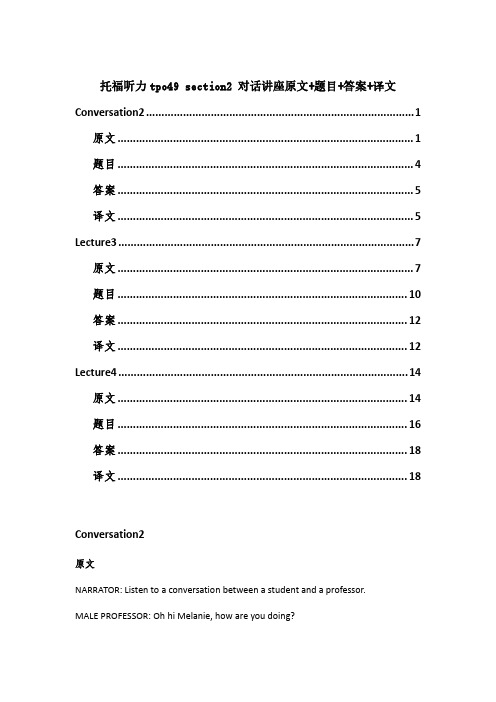
托福听力tpo49section2对话讲座原文+题目+答案+译文Conversation2 (1)原文 (1)题目 (4)答案 (5)译文 (5)Lecture3 (7)原文 (7)题目 (10)答案 (12)译文 (12)Lecture4 (14)原文 (14)题目 (16)答案 (18)译文 (18)Conversation2原文NARRATOR:Listen to a conversation between a student and a professor.MALE PROFESSOR:Oh hi Melanie,how are you doing?FEMALE STUDENT:I'm good thanks.I just have some questions about this paper,for your class.Do you have a second to talk about it now?MALE PROFESSOR:Oh yes,no problem;I have about20minutes before my next class.Will that be enough time?FEMALE STUDENT:Yeah I think so.Okay so the thing is,you know,okay I'm writing my paper on the history of jazz in New York City.MALE PROFESSOR:Alright,well that's a pretty broad subject.FEMALE STUDENT:Well actually I'm focusing on a specific decade–the50s–and on and I’m only doing it on a few specific artists.MALE PROFESSOR:Oh okay–because I was going to say that seemed a bit,ah,too ambitious for a10page paper.FEMALE STUDENT:Yeah.No,it's not the subject I'm having trouble with–actually the paper is practically writing itself,I mean I’ve got a lot to say and it’s going pretty well.The thing is,I have this idea…that might make it better and I was wondering if there’s any way I could get an extension…I mean I know it’s due next week right?MALE PROFESSOR:That's right,on Monday.But I don't understand,it sounds like you’re doing so well;why do you need more time?FEMALE STUDENT:Yeah well,I could write the paper as it is and turn it in on time and it would be fine…MALE PROFESSOR:But…?FEMALE STUDENT:But I was just talking to one of my friends,whose family has lived in New York forever,and it turns out that her grandfather was actually there in the period of jazz I'm writing about–I mean he was a jazz musician and he actually,like personally knew the artists I'm writing about.MALE PROFESSOR:You're kidding!Well that’s a coincidence.FEMALE STUDENT:Yeah,I know,it's cool,right?So anyway,that's why I waswondering if I could get an extension,because I thought it would be really great if I could like,interview him,for my paper…MALE PROFESSOR:Ah.FEMALE STUDENT:But I don’t think I can meet with him until early next week,so [trailing off]…MALE PROFESSOR:Ah I see,well!It would certainly add a new dimension to your paper,wouldn’t it?Have you talked with this gentleman yet?FEMALE STUDENT:Um,no,but I talked to my friend,just,you know ran the idea past her,and she said he would probably love to do it.But,you know,he's busy until next week.MALE PROFESSOR:Okay well,yeah!I think that in this case we can definitely extend your deadline until,let’s say,Friday next week?FEMALE STUDENT:Okay that would be great.MALE PROFESSOR:But just to be fair,why don't you turn in an outline of your paper on the due date.FEMALE STUDENT:The outline...oh that's no problem.It's basically done except for the parts about the interview...MALE PROFESSOR:Oh yeah...the interview.Could you have the questions ready then too...the ones you’re planning on asking?FEMALE STUDENT:Sure,yeah I can do that,too.MALE PROFESSOR:And then I'll expect the final draft next Friday.FEMALE STUDENT:Okay great!Thanks.MALE PROFESSOR:Sure,I'm looking forward to reading it!题目1.Why does the student go to see the professor?A.To ask if she can interview him for her paperB.To ask permission to extend the length of her paperC.To ask permission to change the topic of her paperD.To ask for more time to finish her paper2.What can be inferred about the student's work on her paper so far?A.She received a lot of help on the paper from professional musicians.B.She has found enough information to complete the paper.C.She did not start working on the paper early enough.D.She is having difficulty finding sources for the paper.3.Why does the student want to interview her friend's grandfather?A.He has written articles about jazz music in New York City.B.He has recordings of the musicians discussed in the woman's paper.C.He owned a historic jazz club in New York City.D.He was a jazz musician during the1950s.4.What does the professor ask the student to do on the original due date of the paper?[Click on two answers.]A.Turn in her first draftB.Hand in an outlineC.Submit interview questionsD.Confirm that she has scheduled an interview5.Why does the student say this:Professor:All right.Well,that's a pretty broad subject.Student:Well,actually I'm focusing on a specific decade,the50s.A.To address the professor's concernB.To explain a change in her approach to her paperC.To restate the professor's pointD.To request approval of her topic答案D B D BC A译文旁白:听一段学生和教授之间的对话。
Environmental Science环境科学
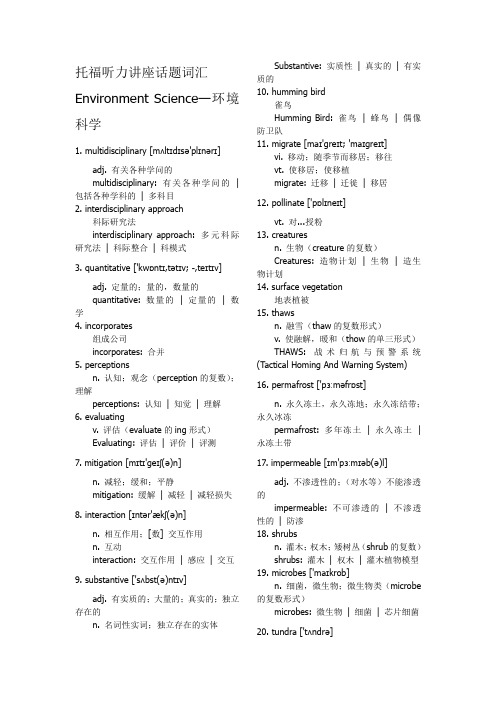
托福听力讲座话题词汇Environment Science—环境科学1.multidisciplinary[mʌltɪdɪsə'plɪnərɪ]adj.有关各种学问的multidisciplinary:有关各种学问的|包括各种学科的|多科目2.interdisciplinary approach科际研究法interdisciplinary approach:多元科际研究法|科际整合|科模式3.quantitative['kwɒntɪ,tətɪv;-,teɪtɪv]adj.定量的;量的,数量的quantitative:数量的|定量的|数学4.incorporates组成公司incorporates:合并5.perceptionsn.认知;观念(perception的复数);理解perceptions:认知|知觉|理解6.evaluatingv.评估(evaluate的ing形式)Evaluating:评估|评价|评测7.mitigation[mɪtɪ'geɪʃ(ə)n]n.减轻;缓和;平静mitigation:缓解|减轻|减轻损失8.interaction[ɪntər'ækʃ(ə)n]n.相互作用;[数]交互作用n.互动interaction:交互作用|感应|交互9.substantive['sʌbst(ə)ntɪv]adj.有实质的;大量的;真实的;独立存在的n.名词性实词;独立存在的实体Substantive:实质性|真实的|有实质的10.humming bird雀鸟Humming Bird:雀鸟|蜂鸟|偶像防卫队11.migrate[maɪ'greɪt;'maɪgreɪt]vi.移动;随季节而移居;移往vt.使移居;使移植migrate:迁移|迁徙|移居12.pollinate['pɒlɪneɪt]vt.对...授粉13.creaturesn.生物(creature的复数)Creatures:造物计划|生物|造生物计划14.surface vegetation地表植被15.thawsn.融雪(thaw的复数形式)v.使融解,暖和(thow的单三形式)THAWS:战术归航与预警系统(Tactical Homing And Warning System)16.permafrost['pɜːməfrɒst]n.永久冻土,永久冻地;永久冻结带;永久冰冻permafrost:多年冻土|永久冻土|永冻土带17.impermeable[ɪm'pɜːmɪəb(ə)l]adj.不渗透性的;(对水等)不能渗透的impermeable:不可渗透的|不渗透性的|防渗18.shrubsn.灌木;权木;矮树丛(shrub的复数)shrubs:灌木|权木|灌木植物模型19.microbes['maɪkrob]n.细菌,微生物;微生物类(microbe 的复数形式)microbes:微生物|细菌|芯片细菌20.tundra['tʌndrə]n.[生态]苔原;[地理]冻原;冻土地带tundra:苔原|冻原|坦途21.insulating['insjuleitiŋ]adj.绝缘的;隔热的v.使绝缘(insulate的ing形式);隔离insulating:绝缘的|隔热的|隔离22.prairiesn.(美)大草原(prairie的复数)Prairies:北美大草原|大草原|大草原地区23.artificially[,a:ti'fiʃəli]adv.人工地;人为地;不自然地artificially:人工|人为地|不自然地24.phosphorus cycle磷素循环[海洋]磷循环phosphorus cycle:磷循环|磷素循环25.citrus['sɪtrəs]n.[园艺]柑橘属果树;柑橘类的植物adj.柑橘属植物的Citrus:柑橘属|柑橘|柑桔属26.swampy land湿地27.marshy['mɑːʃɪ]adj.沼泽的;湿地的marshy:沼泽地的|有沼泽的|沼地的28.adaptationsn.适应;改编(adaptation的复数)Adaptations:改编|适应性|原着改编29.drainage['dreɪnɪdʒ]n.排水;排水系统;污水;排水面积Drainage:给排水|排水|暖通工程师30.genuinely['dʒenjuinli]adv.真诚地;诚实地genuinely:真正地|真诚地|由衷地31.virtually['vɜːtjʊəlɪ]adv.事实上,几乎;实质上virtually:几乎|实际上|事实上32.diffused[di'fju:zd]adj.散布的,扩散的;普及的v.散布,传播(diffuse的过去分词);使分散diffused:普及的|散布的|散射的33.interrelationship[,ɪntərɪ'leʃnʃɪp]n.相互关系interrelationship:相互关系|互相之间的关系|干扰34.interdependent[ɪntədɪ'pendənt]adj.相互依赖的;互助的Interdependent:共生|相互依赖的|互助的35.beaversn.海狸(beaver的复数)v.勤奋工作(beaver的第三人称单数)Beavers:海狸一家|海狸|河狸36.ecosystem['iːkəʊsɪstəm]n.生态系统ecosystem:生态系统|生态系|生态体系37.keystone species关键种keystone species:关键种|关键物种|基石物种38.orbit['ɔːbɪt]n.轨道;眼眶;势力范围;生活常规vi.盘旋;绕轨道运行vt.绕轨道而行orbit:轨道|眼眶|环绕39.oval['əʊv(ə)l]n.椭圆形;卵形adj.椭圆的;卵形的Oval:椭圆形|椭圆的|卵状的40.elliptical[ɪ'lɪptɪk(ə)l]adj.椭圆的;省略的elliptical:椭圆星系|椭圆的|椭圆形的41.the northern hemisphere北半球the Northern Hemisphere:北半球|半球42.axial tilt轴倾角;[机]轴面刃倾角axial tilt:转轴倾角|轴面刃倾角|轴倾角43.severe[sɪ'vɪə]adj.严峻的;严厉的;剧烈的;苛刻的severe:严重的|严厉|严格的44.precession[prɪ'seʃ(ə)n]n.岁差(等于precession of the equinoxes);先行;优先precession:进动|旋进|岁差45.scope[skəʊp]n.范围;余地;视野;眼界;导弹射程vt.审视scope:范围|作用域|适用范围46.glaciersn.冰川(glacier的复数);冰河glaciers:冰河|冰川|流亡者47.skeptical['skeptikəl]adj.怀疑的;怀疑论的,不可知论的skeptical:多疑的|怀疑的|怀疑性的48.oceanographer[,əʊʃɪə'nɒɡrəfə]n.海洋学家;海洋研究者oceanographer:海洋学者|海洋学家|海洋研究者49.calcite['kælsaɪt]n.[矿物]方解石calcite:方解石|白色或透明方解石|南寒水石50.depositsn.存款;沉积物(deposit的复数);订金v.沉积(deposit的单三形式);存储;付保证金Deposits:存款额|订金|储蓄51.interglacial[ɪntə'gleɪsɪəl;-ʃ(ə)l]adj.间冰期的interglacial:间冰期|与间冰期52.methane gas沼气methane gas:瓦斯|甲烷气体|甲烷53.carbon dioxide[无化]二氧化碳Carbon Dioxide:二氧化碳|二氧货碳|一氧化碳54.the peak峰值The Peak:山顶|山顶站|最高点55.methane['miːθeɪn;'meθeɪn]n.[有化]甲烷;[能源]沼气methane:甲烷|沼气|甲醇56.associated with与有关系;与相联系associated with:有关于|关联文件|与57.the implication隐含The Implication:言外之意58.uncharted[ʌn'tʃɑːtɪd]adj.未知的;图上未标明的Uncharted:神秘海域|秘境探险|海图尚未标明的59.territory['terɪt(ə)rɪ]n.领土,领域;范围;地域;版图territory:领土|地盘|领域60.fossil fuels化石燃料矿物燃料Fossil fuels:矿物燃料|化石燃料|化石能源61.albedo[æl'biːdəʊ]n.(行星等的)反射率;星体反照率albedo:反照率|反射率|反射系数62.radiation budget[物]辐射收支radiation budget:辐射收支63.transmit[trænz'mɪt;trɑːnz-;-ns-]vt.传输;传播;发射;传达;遗传vi.传输;发射信号transmit:传播|传递|传送64.predominate[prɪ'dɒmɪneɪt]vt.支配,主宰;在中占优势vi.占主导(或支配)地位;占优势predominate:支配|占优势|占主导地位65.portion['pɔːʃ(ə)n]n.部分;一份;命运vt.分配;给嫁妆portion:一部分|部分|一份66.microscopic[maɪkrə'skɒpɪk]adj.微观的;用显微镜可见的microscopic:微观的|用显微镜可见的|微小的67.marine plants海洋植物marine plants:海洋植物68.dimethydimethy:二氯化二甲基锡69.accelerate[ək'seləreɪt]vt.使加快;使增速vi.加速;促进;增加accelerate:加速|促进|加快70.microorganismsn.微生物,微生虫(microorganism的复数)Microorganisms:微生物|微生物用营养物质|微生物群。
2017年2月25日托福听力真题及答案解析

2017年2月25日托福听力真题及答案解析下面是2017年2月25日托福阅读真题及答案解析,大家试着做一下再对答案,祝你们考试顺利!2017年2月25日托福听力真题及答案解析C1 office hours 论文话题-雕塑主题学生去找professor说需要go over 一下他的essay,其中有几个问题,然后教授就建议学生可以多做一些话题相关的研究,比如Edgar Degas的雕像作品Little Dancer Aged Fourteen一开始材料不是青铜,而是Vex version,青铜只是一个在ED死了之后别人所造的copy,还有就是原版中的雕像动作也是和青铜版的不一样,青铜版的作品中舞者的头抬得更高一些,学生听完建议以后,感觉他的论文改起来不会太难(考点,有个态度题)。
TPO相似文章:TPO30C2-Writing about Van Gogh’s paintingC2 service encounters图书馆话题-找资料学生去找图书管理员解决一个学生员工帮他解决不了的事情,有一本有关历史方面的书,在图书馆相应的书架上面找不到,管理员有些书可能没有放在相应的位置,然后学生想问下是否还有其他关于这本书的来源,管理员在系统里找到了关于这个书还回的信息,但是工作人员应该还没有放到相应的书架上面去,可能需要等一星期左右的时间,但是学生的作业下个星期就要交了,管理员建议他去问教授要一份copy,学生委婉的拒绝了这个建议,因为他的作业早就该完成了,但是现在还没有完成,不好意思去问教授要书,可能让教授推荐另一本书,最后管理员还是要求学生把邮件信息留下,找到了书联系他。
TPO相似文章:TPO24-C1-Looking for New Kind of ScienceTPO27-C1-Looking for Books on New ZealandL1 商科-管理学每个公司有自己的管理结构,但是怎么知道这个管理结构是有效的,讲座中提到了the McKinney Study(麦肯锡研究),从三个方面来说明可帮助公司有效管理,第一是direction,公司的领导是要让员工明白公司的目标,有目标以后再结合适当的刺激措施,这样的话员工的效率更高,举了关于bonus的例子来说明这点的重要性(考点,问为什么举这个例子),第二是accountability ,即要让员工清楚明白自己的责任有哪些,举了与合伙人公司谈判的例子来说明accountability的重要性(考点:问为什么举这个例子),第三是culture,即公司应该创造一个合适的环境,让员工敢于承认错误,提出错误,对于员工提出错误一开始应该表示感谢,然后和员工一起找到解决方案。
2018年3月24日托福听力真题回忆及解析
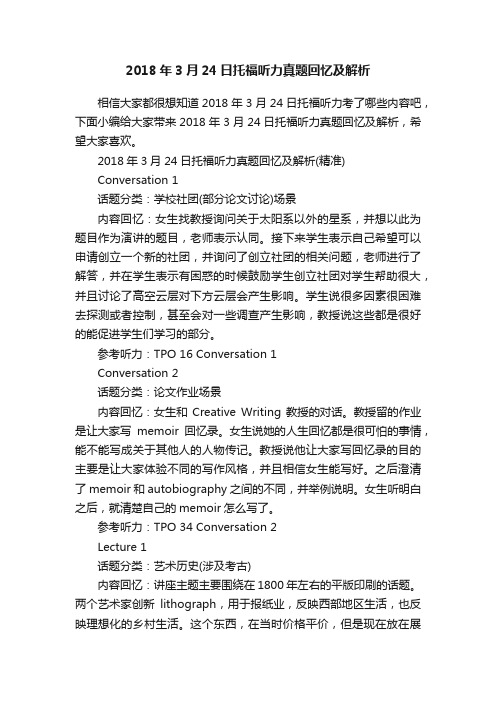
2018年3月24日托福听力真题回忆及解析相信大家都很想知道2018年3月24日托福听力考了哪些内容吧,下面小编给大家带来2018年3月24日托福听力真题回忆及解析,希望大家喜欢。
2018年3月24日托福听力真题回忆及解析(精准)Conversation 1话题分类:学校社团(部分论文讨论)场景内容回忆:女生找教授询问关于太阳系以外的星系,并想以此为题目作为演讲的题目,老师表示认同。
接下来学生表示自己希望可以申请创立一个新的社团,并询问了创立社团的相关问题,老师进行了解答,并在学生表示有困惑的时候鼓励学生创立社团对学生帮助很大,并且讨论了高空云层对下方云层会产生影响。
学生说很多因素很困难去探测或者控制,甚至会对一些调查产生影响,教授说这些都是很好的能促进学生们学习的部分。
参考听力:TPO 16 Conversation 1Conversation 2话题分类:论文作业场景内容回忆:女生和Creative Writing 教授的对话。
教授留的作业是让大家写memoir回忆录。
女生说她的人生回忆都是很可怕的事情,能不能写成关于其他人的人物传记。
教授说他让大家写回忆录的目的主要是让大家体验不同的写作风格,并且相信女生能写好。
之后澄清了memoir和autobiography之间的不同,并举例说明。
女生听明白之后,就清楚自己的memoir怎么写了。
参考听力:TPO 34 Conversation 2Lecture 1话题分类:艺术历史(涉及考古)内容回忆:讲座主题主要围绕在1800年左右的平版印刷的话题。
两个艺术家创新lithograph,用于报纸业,反映西部地区生活,也反映理想化的乡村生活。
这个东西,在当时价格平价,但是现在放在展馆里,价值成千上万。
教授说现在的考古学界对pottery一般是用单一的分类方法,但是她认为这样不全面,比如咱们班这两个同学来自不同的城市,看起来没有共同点,但是如果从别的角度会发现他们都爱滑雪,所以她认为分类时应该考虑很多因素,说了4~5个,主要介绍了shape。
托福听力tpo40 全套对话讲座原文+题目+答案+译文
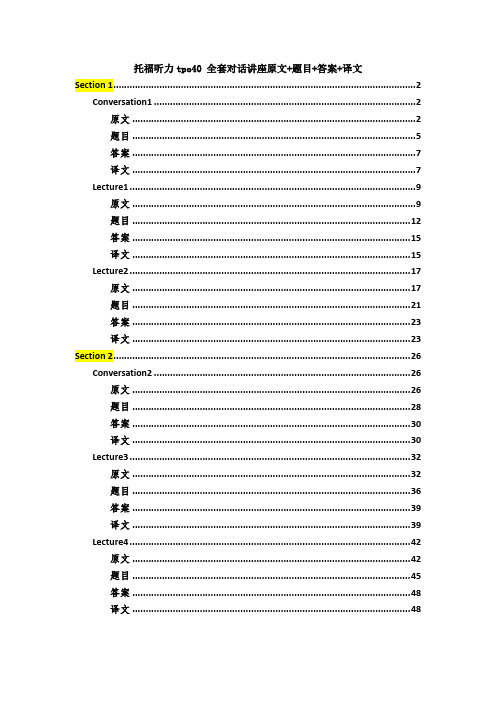
托福听力tpo40 全套对话讲座原文+题目+答案+译文Section 1 (2)Conversation1 (2)原文 (2)题目 (5)答案 (7)译文 (7)Lecture1 (9)原文 (9)题目 (12)答案 (15)译文 (15)Lecture2 (17)原文 (17)题目 (21)答案 (23)译文 (23)Section 2 (26)Conversation2 (26)原文 (26)题目 (28)答案 (30)译文 (30)Lecture3 (32)原文 (32)题目 (36)答案 (39)译文 (39)Lecture4 (42)原文 (42)题目 (45)答案 (48)译文 (48)Section 1Conversation1原文NARRATOR: Listen to a conversation between a student and a business professor.MALE STUDENT: Thanks for seeing me, Professor Jackson.FEMALE PROFESSOR: Sure, Tom. What can I do for you?MALE STUDENT: I'm gonna do my term project on service design, uh, what you see as a customer …the physical layout of the building, the parking lot. And I thought I'd focus on various kinds of eateries …restaurants, coffee shops, cafeterias, so I'd also analyze where you order your food, where you eat, and so on.FEMALE PROFESSOR: Wait, I thought you were going to come up with a hypothetical business plan for an amusement park? Isn’t that what you e-mailed me last week?I could've sworn …. Oh! I'm thinking of a Tom from another class.Tom Benson. Sorry, sorry.MALE STUDENT: No problem. I did e-mail you my idea too, though …. FEMALE PROFESSOR: Oh, that's right. I remember now. Restaurants …yeah …MALE STUDENT: So, here's my question. I read something about service standard that kinda confused me. What’s the difference between service design and service standard?FEMALE PROFESSOR: Service standard refers to what a company …employees …are ideally supposed to do in order for everything to operate smoothly. The protocols to be followed.MALE STUDENT: Oh, OK.FEMALE PROFESSOR: Um, so backing up…Service design is…uh, think of the cafeteria here on campus. There are several food counters, right? All with big, clear signs to help you find what you're looking for—soups, salads, desserts—so you know exactly where to go to get what you need. And when you're finished picking up your food, where do you go?MALE STUDENT: To the cash registers.FEMALE PROFESSOR: And where are they?MALE STUDENT: Um, right before you get to the seating area.FEMALE PROFESSOR: Exactly. A place that you would logically move to next.MALE STUDENT: You know, not every place is like that. This past weekend was my friend's birthday, and I went to a bakery in town, to pick up a cake for her party. And the layout of the place was weird: People were allin each other's way, standing in the wrong lines to pay, to place orders…. Oh! And another thing? I heard this bakery makes really good apple pie, so I wanted to buy a slice of it, too.FEMALE PROFESSOR: OK.MALE STUDENT: There was a little label that said “apple pie,” where it's supposed to be, but there wasn’t any left.FEMALE PROFESSOR: And that's what's called a service gap. Maybe there wasn't enough training for the employees, or maybe they just ran out of pie that day. But something's wrong with the process, and the service standard wasn’t being met.MALE STUDENT: OK, I think I get it. Anyway, since part of the requirements for the term project is to visit an actual place of business, do you think I could use our cafeteria? They seem to have a lot of the things I'm looking for.FEMALE PROFESSOR: Well, campus businesses like the cafeteria or bookstore don't quite follow the kinds of service models we're studying in class. You should go to some other, local establishment, I'd say.MALE STUDENT: I see.FEMALE PROFESSOR: But just call the manager ahead of time so they aren't surprised.题目1.Why does the student go to see the professor?A. To find out all the requirements for a projectB. To discuss a service gap at a restaurantC. To get help understanding concepts relevant to his projectD. To get help with designing a business plan2.Why does the professor mention a student in another class?A. To describe an interesting topic for a projectB. To explain the cause of her initial confusionC. To point out that she has not received e-mails from all her students yetD. To indicate that she has several students doing projects about restaurants3.Why does the professor talk about the cafeteria on campus?A. To give an example of an effective service designB. To illustrate how service standards can inform service designC. To help the man understand a service problemD. To illustrate the concept of a service gap4.What do the speakers imply about the bakery the student went to recently? [Click on 2 answers.]A. The apple pie he bought there was not as good as it usually is.B. The bakery's service design was inefficient.C. The bakery needs additional employees to fix a service gap.D. The bakery did not meet a service standard.5.What does the professor say the student should do for his project?A. Compare an on-campus service model with an off-campus oneB. Interview the service manager and employees at the cafeteriaC. Recommend service improvements at the cafeteria and the bookstoreD. Analyze the service design of a nearby restaurant答案C B A BD D译文旁白:下面听一段学生和商务课教授间的对话。
托福听力TPO11原文 Lecture 3-智课教育旗下智课教育

智 课 网 托 福 备 考 资 料托福听力TPO11原文 Lecture 3-智课教育旗下智课教育以下是小编为大家整理的托福听力TPO11原文中Lecture 3的文本内容,希望大家能够认真阅读,不懂的地方可以参考翻译,相信会有所收获。
下面就让小编来为大家介绍一下托福听力TPO11原文中Lecture 3的文本内容吧,大家要好好把握,这些都是非常有价值的材料,同时,大家也可以登录智课教育论坛进行TPO练习辅导,希望能够给准备托福听力的同学带来帮助。
TPO11 Lecture 3 Environmental scienceProfessor:When land gets develop for human use, the landscape changes. We don’t see as many types of vegetation, trees, grasses and so forth. This in turn leads to other losses: the loss of animal that once lived there. Err…but these are the obvious changes, but there are also less obvious changes like the climate.One interesting case of this…of…of changes in the local land use causing changes in climate, specifically the temperature is in Florida. Now what comes to mind when you think of the state of Florida?Student A:Sunshine, beaches.Student B:Warm weather, oranges…Professor:Yes, exactly. Florida has long had a great citric industry; large growth of oranges, lemons and the like. Florida’s winter is very mild; the temperature doesn’t often get below freezing. But there are some areas in Florida that do freeze. So in the early 1900s, farmers moved even further south in Florida, to areas that were even less likely to freeze. Obviously, freezing temperatures are danger to the crops. A bad barrier of cold weather, a long spell of frosts could ruin a farm and the entire crop, anyway, before these citric growers moved south, much of the land in south Florida, was what we called wetlands.Wetlands are areas of marshy, swampy land, areas where water covers thesoil, or is present either at or near the surface of the soil for large part of the year. Wetlands have their own unique ecosystem, with plants and animals with special an interesting adaptation. Very exciting, but it’s not what we are talking about today. Emm…where was I?Student A:Farmers moved south?Professor:Oh, yes. Farmers moved south. But the land was not suitable for farming. You can’t grow orange in wetland, so farmers had to transform the wetlands into lands suitable for farming. To do that, you have to drain the water from theland,move the water elsewhere, and divert to the water sources such as rivers. Hundreds of miles of drainage canals were built in the wetlands. Now these areas, the new areas the farmers moved to, used to be warm and unlikely to freeze, however, recently the area has become susceptible to freezes. And we are trying to understand why.Student B:Is it some global temperature change or weather pattern like El Ni?o or something?Professor:Well, there are two theories. One idea is as you suggested that major weather patterns, something like El Ni?o, are responsible. But the other idea and this is the one that I personally subscribe to, is of the changes in the temperature pattern had been brought about by the loss of wetlands.Student A:Well, how would the loss of wetlands make a difference?Professor:Well, think about what we’ve been studying so far. We discussed the impact of landscapes on temperature, right? What affects does the body of water have on an area?Student A:Oh, yeah. Bodies of water tend to absorb the heat during the day, and then they release the heat at night.Professor:Yes, exactly. What you just said is what I want you all to understand. Bodies of water release heat and moisture backinto the environment. So places near large bodies of water are generally milder, err...slightly warmer than those without water. And what I, another think is that the loss of the wetlands has created the situation where the local temperatures in the area are not slightly different, slightly colder than they were 100 years ago, before the wetland were drained.Student B:Emm…do we know what the temperature was like back then?Professor:Well, we were able to estimate this. We have data about South Florida’s current landscape, emm…the plant cover. And we were able to reconstruct data about the landscape prior to 1900. Then we enter those data, information about what the landscape look like before and after the wetlands weredrained.We enter the data into a computer weather model. This model can predict temperatures. And when all the data were entered, an overall cooling trend was predicted by the model.Student B:How much colder does it get now?Professor:Well, actually the model shows a drop of only a few degrees Celsius. But this is enough to cause dramatic damage to crops. If temperatures over night are already very close to the freezing point, then this drop of just a few degrees can take the temperature below freezing. And freezing causes frosts, which kill crops. These damaging frosts wouldn’t happen if the wetlands were still in existence, just as the tiny temperature difference can have major consequences.《环境科学》教授:当土地发展到适应人类使用,景色就发生了变化。
托福听力tpo44 全套对话讲座原文+题目+答案+译文
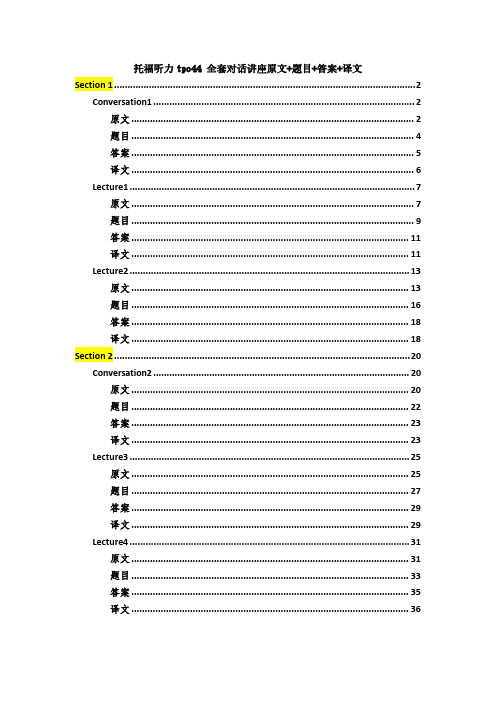
托福听力tpo44全套对话讲座原文+题目+答案+译文Section1 (2)Conversation1 (2)原文 (2)题目 (4)答案 (5)译文 (6)Lecture1 (7)原文 (7)题目 (9)答案 (11)译文 (11)Lecture2 (13)原文 (13)题目 (16)答案 (18)译文 (18)Section2 (20)Conversation2 (20)原文 (20)题目 (22)答案 (23)译文 (23)Lecture3 (25)原文 (25)题目 (27)答案 (29)译文 (29)Lecture4 (31)原文 (31)题目 (33)答案 (35)译文 (36)Section1Conversation1原文NARRATOR:Listen to a conversation between a student and her sociology professor.MALE PROFESSOR:I'm glad you got my message and were able to make it,but where are the other members of your group,Tom and Jane?FEMALE STUDENT:They're actually at the library.They have a biology lab assignment that's due later this afternoon,so I'm here to represent the whole group.But,um,when we got your e-mail message—about being worried about our research project—we were a little confused.We thought you were excited about our idea for the project.MALE PROFESSOR:Well,I think it's a great research topic,but when I looked closely at your plan for accomplishing the research,I realized that your group was probably asking for some trouble.FEMALE STUDENT:What do you mean?I thought that you know,by monitoring students studying in the library,we could really,uh,get a good understanding of people’study habits and stuff.MALE PROFESSOR:The thing is,I think you might have a problem because of the Hawthorne effect.FEMALE STUDENT:The Hawthorne effect?MALE PROFESSOR:The Hawthorne effect is a technical term for when researchers. uh,more or less forget about a specific variable,the variable of the researchers themselves.Now,the students in the library,they're going to know that you’re observing them, right?So you have to consider the effect your very presence will have on the peopleyou’re observing.FEMALE STUDENT:But,so you think,I-I mean,it's not like our observations would be a secret.The students would know exactly what we'd be doing.I mean,we'd put up a sign right outside the library.MALE PROFESSOR:Yes,but that’s just it.When people know they're being watched, they act differently.Let me explain how the Hawthorne effect got its name and well, you'll get the idea.See,there was a manufacturing facility called the Hawthorne plant.And researchers conducted some experiments there to see what conditions made workers the most productive.FEMALE STUDENT:What sort of conditions?MALE PROFESSOR:Well,one thing they experimented with was the lights.Were workers more productive with bright lights or dim lights?Well,here’s the thing: Whatever the researchers did,the workers’productivity increased.When the lighting was improved,productivity went up.When the lighting was dimmed,productivity went up again.FEMALE STUDENT:That doesn't make a lot of sense.MALE PROFESSOR:Exactly.So initially,the experiment was considered a failure.But then the researchers realized that their own presence had affected the workers' productivity.The workers knew that the researchers were watching them,and with so much attention on them,the workers felt compelled to work harder.FEMALE STUDENT:Oh,I guess that really could be an issue with my group's research.MALE PROFESSOR:Yes.But I don't want to send you all back to square one,so how about you set up a meeting with your group members and discuss this.Then we can meet again and go over your ideas and I think that we should be able to figure out a way to get around the problem.题目1.Why does the student go to see the professor?A.To get his opinion about why a project she recently completed had unexpected results.B.To discuss how a topic covered in class is similar to her group's research topic.C.To ask him for suggestions to address a problem in her research.D.To discuss the professor's concern about her group's research project.2.In response to the professor's question,what does the woman say about Tom and Jane?A.They are working on an assignment for another class.B.They are already observing students for the research project.C.They are dealing with a technical issue at the library.D.They are making arrangements at the library for their research project.3.What had the group of students planned to research?A.The effect of noise on the productivity of library employees.B.The effect of changing the amount of light in the library.C.The study habits of students in the library.D.The effect that being observed while studying has on students.4.Why does the professor mention lighting?A.To explain why production costs gradually increased over the years at a manufacturing plantB.To give a reason for a decline in productivity at two manufacturing plantsC.To compare the working conditions at two manufacturing plantsD.To give an example of a working condition that was adjusted at a manufacturing plant5.Why does the student say this?Now,the students in the library…they're going to know that you’re observing them,right?So you have to consider the effect your very presence will have on the people you’re observing.FEMALE STUDENT:But,so you think,I mean,it's not like our observations would be a secret.The students would know exactly what we'd be doing.A.She is disappointed with the observations that the members of her group have made so far.B.She does not understand the point that the professor is making.C.She wants to determine a way for her group to make observations in secret.D.She is aware that her group’s presence might affect student behavior.答案D A C D B译文旁白:请听一段学生和她的社会学教授的对话。
托福听力tpo65 lecture1、2、3 原文+题目+答案+译文
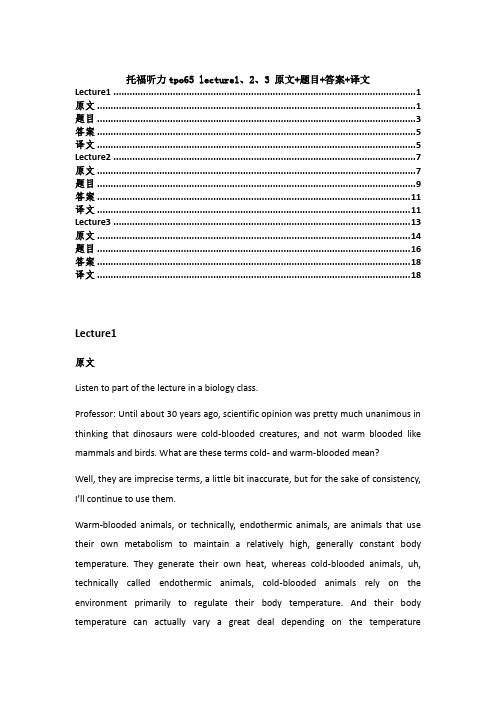
托福听力tpo65 lecture1、2、3 原文+题目+答案+译文Lecture1 (1)原文 (1)题目 (3)答案 (5)译文 (5)Lecture2 (7)原文 (7)题目 (9)答案 (11)译文 (11)Lecture3 (13)原文 (14)题目 (16)答案 (18)译文 (18)Lecture1原文Listen to part of the lecture in a biology class.Professor: Until about 30 years ago, scientific opinion was pretty much unanimous in thinking that dinosaurs were cold-blooded creatures, and not warm blooded like mammals and birds. What are these terms cold- and warm-blooded mean?Well, they are imprecise terms, a little bit inaccurate, but for the sake of consistency, I’ll continue to use them.Warm-blooded animals, or technically, endothermic animals, are animals that use their own metabolism to maintain a relatively high, generally constant body temperature. They generate their own heat, whereas cold-blooded animals, uh, technically called endothermic animals, cold-blooded animals rely on the environment primarily to regulate their body temperature. And their body temperature can actually vary a great deal depending on the temperaturesurrounding them.Now, as I said, mammals and birds are warm-blooded creatures, and we being mammals, you’re familiar with, you know, your body stays pretty much the same temperature all the time, whereas if you’ve ever seen, say, snakes or lizards you know, basking in the sun on the rock, you can see the characteristic feature of a cold-blooded creature that is using the environment to help regulate its body temperature.As I said, until about 30 years ago, dinosaurs were, because they seem to most closely resemble reptiles, they were thought to be cold-blooded. Then about 30 years ago a number of scientists began to suggest the possibility that dinosaurs might in fact be warm-blooded. This was very exciting for a variety of reasons. Warm-blooded creatures are closer to us. They are more active. They move faster. They can live in a wider range of environments than cold-blooded creatures. So a lot of scientists kind of got on this bandwagon for warm-blooded dinosaurs. But unfortunately, a lot of the evidence for dinosaurs possibly being warm-blooded is indirect. Among the pieces of evidence is that the fossilized remains of dinosaurs have shown that certain kinds of dinosaurs had feathers.Now, feathers in birds, one of their main functions, apart from helping certain birds to fly, is that they are an insulator. They preserve body heat, so by analogy, some people are argued, well, ok, if they were feathered dinosaurs, maybe they had feathers for insulation. Yes, maybe. But maybe not.Another piece of indirect evidence is that some dinosaurs, uh, well, some dinosaur remains have been found in areas, latitudes that today have arctic climates and might in fact had very cold climates at the time that the dinosaurs were living there. It’s hard to function as a cold-blooded creature in an arctic climate. Unfortunately, we don’t have exact climate information. It’s only been suggested that these areas might have been as cold as they are today. So again, this is not, you know, not a knockdown argument in favor of dinosaurs being warm-blooded.Another argument for the warm-blooded theory has to do with looking at the anatomy of dinosaurs and at the similarities with warm-blooded animals. If you look at what’s around today, well, let’s see, today anything that walks on two legs is warm-blooded. That goes for humans and some other primates, and birds like the ostrich, okay? Only warm-blooded creatures, you know, like ostriches, have upright posture.Alright, so proponents of the idea that dinosaurs were warm-blooded say, well, look at dinosaurs, some of them had upright posture too. Coincidence? They say no, these two-legged dinosaurs were warm-blooded too. Okay, but on the other hand, as far as we can tell, dinosaurs lacked a body structure called the respiratory turbinate. Why is that significant?Respiratory turbinate are these complicated structures inside the nasal cavity. They are aligned with soft tissue and their function is that as the air passes through these complicated kinds of curlicue passages, air coming in is warmed up, so that warm-blooded creature isn’t shocked by.. Its lungs aren’t shocked by receiving cold air directly from the outside, which would really disturb its internal temperature. So unless there are some other mechanism that we don’t know about, it seems that these, that dinosaurs lacked this vital feature of all existing warm-blooded animals.题目1.What is the main purpose of the lecture?A. To explain the differences between dinosaurs and modern-day animalsB. To present evidence for a theory that dinosaurs were warm-bloodedC. To describe the body structures of recently discovered dinosaursD. To compare the fossils of warm- and cold-blooded dinosaurs2.There is evidence that some dinosaurs had feathers. According to the professor, why does this support the theory that dinosaurs were warm-blooded?A. Feathers prevented dinosaurs’ body heat from escaping.B. Feathers show that dinosaurs were capable of flight.C. Dinosaurs and birds descended from the same evolutionary ancestor.D. Dinosaurs used feathers to absorb heat from the sun’s rays.3.What does the professor imply about regions that now have arctic climates?A. They can probably support both warm- and cold-blooded modern animals.B. They might have been warmer in the past than they are now.C. They are areas in which dinosaurs were never able to live.D. They are good sources of fossils of feathered dinosaurs.4.Why does the professor mention ostriches?A. To point out that not all birds are able to flyB. To cite evidence that dinosaurs were cold-bloodedC. To show that not all birds have respiratory turbinatesD. To give an example of an animal with upright posture5.What is the professor's opinion of the theory that dinosaurs were warm-blooded?A. It has changed our understanding of the term “warm-blooded.”B. Thirty years ago it was not convincing, but today most evidence supports it.C. It needs more evidence in order to be convincing.D. Most of the evidence we have supports a different theory.6.What does the professor imply when she says this:A. Warming up air may not be as important a function as many scientists believe.B. Cold-blooded animals may use a different mechanism from warm-blooded animals.C. It is possible that dinosaurs had another way to warm up air they breathed.D. Warm-blooded dinosaurs were probably very different from warm-blooded animals today.答案B A B DC C译文请听生物课上的部分内容。
2024年托福考试听力历年真题全景扫描
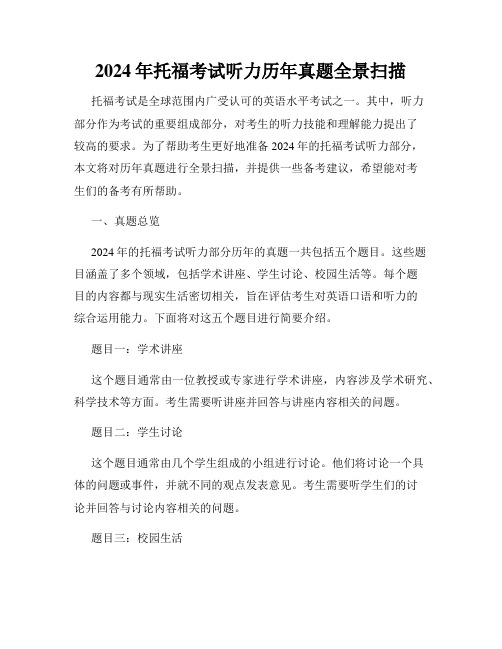
2024年托福考试听力历年真题全景扫描托福考试是全球范围内广受认可的英语水平考试之一。
其中,听力部分作为考试的重要组成部分,对考生的听力技能和理解能力提出了较高的要求。
为了帮助考生更好地准备2024年的托福考试听力部分,本文将对历年真题进行全景扫描,并提供一些备考建议,希望能对考生们的备考有所帮助。
一、真题总览2024年的托福考试听力部分历年的真题一共包括五个题目。
这些题目涵盖了多个领域,包括学术讲座、学生讨论、校园生活等。
每个题目的内容都与现实生活密切相关,旨在评估考生对英语口语和听力的综合运用能力。
下面将对这五个题目进行简要介绍。
题目一:学术讲座这个题目通常由一位教授或专家进行学术讲座,内容涉及学术研究、科学技术等方面。
考生需要听讲座并回答与讲座内容相关的问题。
题目二:学生讨论这个题目通常由几个学生组成的小组进行讨论。
他们将讨论一个具体的问题或事件,并就不同的观点发表意见。
考生需要听学生们的讨论并回答与讨论内容相关的问题。
题目三:校园生活这个题目通常涉及校园生活中的某个具体场景,如学生在图书馆借书、学生会活动等。
考生需要听到场景中的对话或描述,并回答与场景相关的问题。
题目四:学术对话这个题目通常由两个人进行学术讨论,讨论的内容可能涉及研究项目、实验结果等。
考生需要听对话并回答与对话内容相关的问题。
题目五:广播新闻这个题目通常是一段广播新闻的摘录,可能涉及各种领域的新闻,包括政治、科技、环境等。
考生需要听新闻摘录并回答与新闻内容相关的问题。
二、备考建议为了更好地备考托福考试听力部分,以下是一些建议供考生参考。
1. 提前准备在备考听力部分时,建议考生提前准备。
可以利用历年真题进行练习,熟悉各种题型和考试形式。
此外,考生还可以通过听英语新闻、讲座等来提高自己的听力水平。
2. 增强听力技巧除了扎实的语法和词汇基础外,考生还需要提高自己的听力技巧。
例如,可以练习提取关键信息、理解符合语境、判断说话者的态度等。
托福听力tpo49 section1 对话讲座原文+题目+答案+译文
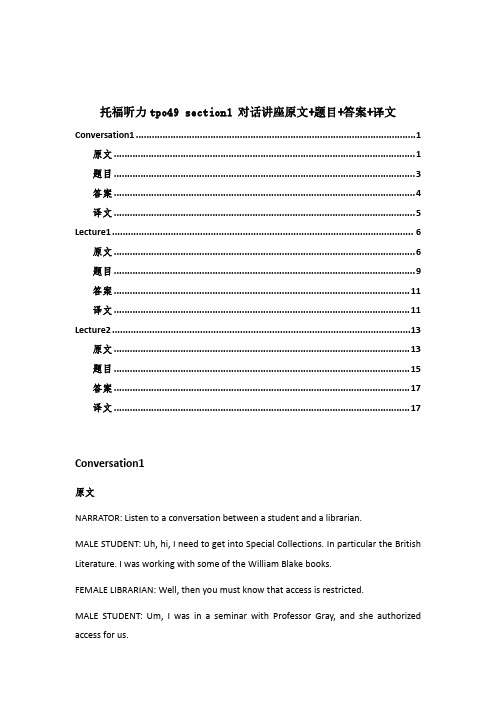
托福听力tpo49section1对话讲座原文+题目+答案+译文Conversation1 (1)原文 (1)题目 (3)答案 (4)译文 (5)Lecture1 (6)原文 (6)题目 (9)答案 (11)译文 (11)Lecture2 (13)原文 (13)题目 (15)答案 (17)译文 (17)Conversation1原文NARRATOR:Listen to a conversation between a student and a librarian.MALE STUDENT:Uh,hi,I need to get into Special Collections.In particular the British Literature.I was working with some of the William Blake books.FEMALE LIBRARIAN:Well,then you must know that access is restricted.MALE STUDENT:Um,I was in a seminar with Professor Gray,and she authorized access for us.FEMALE LIBRARIAN:Oh,if that's the case…let me check.Right,yeah,but it looks like that expired at the end of last semester.MALE STUDENT:But I really need to get back in there.See,I didn't quite finish my project…FEMALE LIBRARIAN:Ah ha,the plot thickens!Well,it's easy enough;have Professor Gray authorize you again.You see,these editions are rare and shouldn't be handled more than necessary.Can you work from later editions?Or microfilm?MALE STUDENT:Not really…actually my project—well,it involves some annotations in the particular edition here.They haven't been reproduced because they’re really not part of the text.generally clean them up.They’re quite hard to see…FEMALE LIBRARIAN:Well,often the characteristics of the manuscripts have been recorded.These types of extraneous markings might also be noted.MALE STUDENT:I don't think they are.They're very faint,and well,I think I have a new angle on them.There was a study once a long time ago about these notes that everybody else has since taken for granted,without checking for themselves.I think there might have been a mistake in the past,that they were misread…FEMALE LIBRARIAN:So,get Professor Gray…MALE STUDENT:Uh,she's away this semester.I had to beg her to give me extra time on this project.I haven't even received a grade in the class yet.And,this class is a prerequisite for other classes in my major.I really need to see those books so I can finish up this project and get back on course to graduate on time.FEMALE LIBRARIAN:Everybody has special circumstances…MALE STUDENT:Two hours?One hour?I promise to be careful.I just need to look at a few pages with a strong magnifying glass.FEMALE LIBRARIAN:Well,I can't let you in without authorization from your professor. Can you get in touch with her somehow?MALE STUDENT:Maybe she's checking her e-mail.I really thought I'd be able to straighten this out without her.You know,she did me a huge favor by giving me the extra time.I feel like I'm skating on thin ice with her…FEMALE LIBRARIAN:You know,you were lucky to have had permission to look at the books last semester.If we don't maintain our policies,they'll disintegrate.MALE STUDENT:I know.Would an e-mail from her or a phone call be good enough?FEMALE LIBRARIAN:Of course.题目1.What are the speakers mainly discussing?A.The student's difficulties locating sources for a research projectB.The topic of the student's research projectC.The student's request to visit a particular part of the libraryD.Procedures for requesting different editions of a book2.Why is the student unable to use later editions or reproductions of a book he mentions?A.The later editions contain errors.B.Professor Gray specified the use of a particular edition.C.The later editions must be requested from another library.D.Reproductions typically omit the specific material he needs.3.Why is the student reluctant to contact Professor Gray?A.He already has disturbed her several times during her time away from campus.B.He does not feel comfortable about asking her for another favor.C.He does not know her e-mail address.D.He wants to surprise her with a completed project.4.What does the woman imply about the rules regarding Special Collections?A.The rules are unfair to the students.B.The rules are in place to protect the books.C.The rules are determined by the professors.D.The rules have changed since the previous semester.5.What does the woman mean when she says this:FEMALE LIBRARIAN:Everybody has special circumstances.A.She has been in a similar situation herself.B.She will help the student solve his problem.C.She has often heard this kind of story from students.D.She thinks the student should try to understand her situation.答案C D B B C译文旁白:接下来听一段学生和图书管理员之间的对话。
托福听力加试第一套第二篇(大王花)(原文+题+答案)
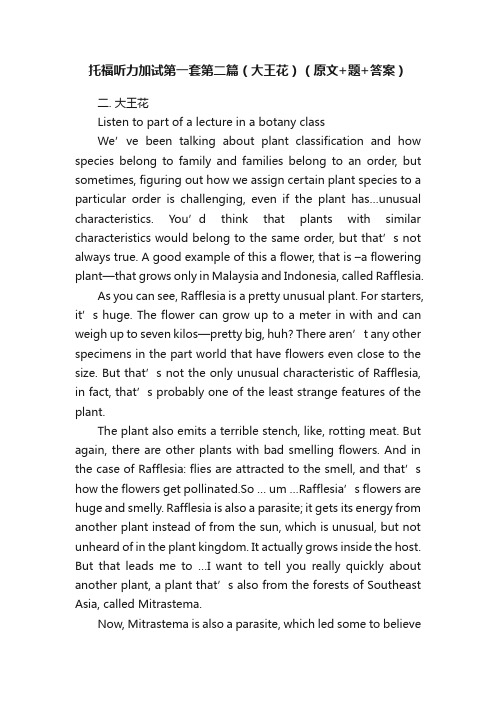
托福听力加试第一套第二篇(大王花)(原文+题+答案)二. 大王花Listen to part of a lecture in a botany classWe’ve been talking about plant classification and how species belong to family and families belong to an order, but sometimes, figuring out how we assign certain plant species to a particular order is challenging, even if the plant has…unusual characteristics. You’d think that plants with similar characteristics would belong to the same order, but that’s not always true. A good example of this a flower, that is –a flowering plant—that grows only in Malaysia and Indonesia, called Rafflesia.As you can see, Rafflesia is a pretty unusual plant. For starters, it’s huge. The flower can grow up to a meter in with an d can weigh up to seven kilos—pretty big, huh? There aren’t any other specimens in the part world that have flowers even close to the size. But that’s not the only unusual characteristic of Rafflesia, in fact, that’s probably one of the least strange featu res of the plant.The plant also emits a terrible stench, like, rotting meat. But again, there are other plants with bad smelling flowers. And in the case of Rafflesia: flies are attracted to the smell, and that’s how the flowers get pollinated.So … um …Rafflesia’s flowers are huge and smelly. Rafflesia is also a parasite; it gets its energy from another plant instead of from the sun, which is unusual, but not unheard of in the plant kingdom. It actually grows inside the host. But that leads me to …I want t o tell you really quickly about another plant, a plant that’s also from the forests of Southeast Asia, called Mitrastema.Now, Mitrastema is also a parasite, which led some to believethe Rafflesia was related to Mitrastema—that they belong to the same order. Mitrastema as I said a parasite, but its flowers are much smaller, and don’t smell bad, so you can see why there was debate about whether they were related. But as it turns out, Mitrastema is actually related to blueberries. So, even plants that share an unusual characteristic with Rafflesia are not related to it. And, um… no plant shares all three of its unusual characteristics, and that made classifying Rafflesia very, very difficult.Now you’re probably thinking, why don’t they just analyze the DNA of the plant? Well, as Isaid, Rafflesia is a parasite. It lacks the leaves; the green tissue that most plants need for photosynthesis. It’s unable to …l um. …To capture the sunlight most other plants use to make food. So, it’s lacking …it doesn’t have the DNA—the genes—for photosynthesis, which is what we usually use to classify plant species. But some researchers in Michigan persisted, and analyzed about 90 species of seed plants and compared them to Rafflesia, and we finally had an answer. Rafflesia was part of the Malpighiales order. Now, other species in the Malpighiales order include violets… um poinsettias… uh … passion-flowers … what else? Willows.So it was pretty unexpected because flowers like violets are a lot smaller than Rafflesia, right? And the y don’t smell bad—they don’t smell like rotting meat … and they’re not parasitic. It took almost 200 years to classify Rafflesia, to identify its relatives, and I don’t think anyone would have ever guessed that it’s in the order Malpighiales. I mean … you know—it’d be nice to be able toclassify species based on their obvious characteristics, but, it didn’t work that way with.Rafflesia. And unfortunately for Rafflesia, and for the field ofbotany. It seems that Rafflesia may be dying out. It’s certainly endangered because of deforestation in its habitat. And to make matters worse, Rafflesi a doesn’t reproduce very well. First of all, only 10-20%of buds tum into full-fledged flowers and it can take them a year to grow. There are also male flowers and female flowers, and one of each has to be in the same area—the same vicinity—at the same time, to produce seeds, and the files that are attracted to the flower’s strongsmell have to carry pollen from one flower to the other, so how often so you think these events occur all together? Even people who study the plant for years may never witness it.1. What is the lecture mainly about?(A) The relationship between species and family.(B) The characteristics of three types of plants.(C) Difficulties classifying an unusual type of plant.(D) Unique examples of parasitic plants2. How does a strong order help Rafflesia?(A) The order is a signal to nearby plants of the opposite sex.(B) The order keeps away large predators that might eat it.(C) The order discourages parasites from growing it.(D) The order attracts files that pollinate its flowers.3. Why does the professor consider the actual classification of Rafflesia unexpected?(A) Its unusual traits are not shared by other plants in its order.(B) Its unusual characteristics were not documented until after it was classified.(C) Botanists had predicted that no other plants would be related to it.(D) Botanists had predicted that it would become extinctbefore it could be classified.4. What does the professor imply about the reproduction of Rafflesia?(A)She has witnessed it herself.(B) It does not occur often.(C) It differs from on variety of Rafflesia to another.(D) No one can understand how it reproduces.Listen again to part of the lecture. Then answer the question.It actually grows inside its host, which is a type of grapevine.I mean… it grows inside its host until itBlooms—it doesn’t bloom inside the host.5. Why does the professor say this:“I mean … it grows inside its host until it blooms—it doesn’t bloom inside the host.”(A) to given an additional example of her statement(B) to clarify her statement so students don’t misunderstand her(C) to provide evidence Rafflesia is indeed a parasitic plant(D) to emphasize the importance of the hostListen again to part of the lecture. Then answer the question.6. What does the professor imply when she says this:“But as it tums out, Mitrastemais actually related to blueberries.”(A) Mitrastema is edible.(B) Rafflesia is also related to blueberries.(C) Rafflesia and Mitrastema are not in the same order.(D) Rafflesia and Mitrastema is also related to blueberries.ANSWERS:1. C2. D3. A4. B5. B6. C。
- 1、下载文档前请自行甄别文档内容的完整性,平台不提供额外的编辑、内容补充、找答案等附加服务。
- 2、"仅部分预览"的文档,不可在线预览部分如存在完整性等问题,可反馈申请退款(可完整预览的文档不适用该条件!)。
- 3、如文档侵犯您的权益,请联系客服反馈,我们会尽快为您处理(人工客服工作时间:9:00-18:30)。
托福听力讲座题目:环境科学课
托福考试中,如果听力部分能够拿到高分成绩,对于我们整体分数的提高,会有很大的帮助。
那么在备考中,托福听力的考试真题,对大家的帮助会更大。
下面小编为大家整理了托福听力讲座题目:环境科学课托福听力考试真题,供大家参考。
托福听力讲座题目:环境科学课
托福考试内容回忆:
环境科学
Environmental science class,讲的是nuclear fusion. 教授先说现在我们和核动力采用的都是核裂变,对吧。
而另一种,核聚变在太阳上最为常见。
但这并不意味着我们人类无法应用核聚变,因为氢以及氢的同位素在地球上很容易获得(考了为什么要提)。
男生提问说,但是我听说核聚变所需要的温度非常高,这怎么解决呢?教授说,现在很多国家在共同建造一个大型的核聚变机器(ITER)。
地点在法国。
核聚变需要巨大的能量,而且核聚变产生的plasma也是too hot to be contained. 为解决这个问题,科学家采用一种方法,让核聚变产生的plasma中的热量,提供核聚变所需要的能量。
也就是一个自己自足的机制。
ITER这个项目已经进行了20多年了,未来至少还要十年才能完成。
建成之后基本适用于research purposes,再到商用至少还要再过20年。
教授说我是挺不耐心的,I need short-term goals to motivate me.(重听题考了)
托福听力lecture之环境科学类相关词汇
lecture之环境科学类词汇:
ecosystem生态系统
balance of nature自然界生态平衡
fauna动物群
flora植物群
rain forest雨林
food chain食物链
acid rain酸雨
greenhouse温室效应
infrared radiation红外线辐射
ozone layer/ozonosphere臭氧层
ultraciolet radiation紫外辐射
托福听力需要多多精听
每一轮考试下来,就有许多学生捶胸顿足,抢呼欲绝,大骂托福变态以此发泄。
哥们,别怪托福,虽然托福叫“我变态(iBT)”,但实际上它是一个非常人性化和有实用的考试,搞定他很EASY。
拿中国人最头痛的部分听力来说,很多学生的反应都是:
1.听力很难练,老师总是提醒我们多听,听不懂也要坚持听,无论什么时候都要听,这叫泛听,基础差的学生,这种听法,对考试来说没有效果。
2.因为听的基础差,所以缺乏归纳的能力,有些学生说我都听懂了,笔记也记得很周全,但就是选不出选项,这太痛苦了!
3.在选项时只选听到的,听不懂的全排除。
4.在听英语的时候,你会发现许多人有不同的姿势:
头一直向上伸着。
眼睛向上翻着。
用手托着耳朵。
屏住呼吸,等等。
以上几种现象,各位可以对照一下,看你属于几种?
要知道,托福考试是目前最有水平的英语语言考试了,那听力考试的选项干扰当然是有一定水平的,但是只要你掌握了它们的“七寸”,就可以在托福听力中游刃有余了。
首先,词汇量。
我不得不老生常谈地再次提起词汇量,听不懂文章就什么技巧也不要说了。
托福的听力既要求你能听懂文章的宏观结构,又要求你关注细节,所以蒙混过关的可能性不大,巨大的词汇量是基本保障。
其次,一定要练习精听。
我最不赞同的是让学生大量的泛听,在听力这件事上,“量”不如“质”。
语言这种东西,如果你听不懂是什么意思,那么听一百遍你还是不知道是什么意思。
一定要先弄懂文章的意思,分析吃透了文章,然后再字斟句酌地反复听,听到恶心为止。
还有许多的“野路子”训练方法,就不一一陈述了。
上述文章中主要表述了考生解答托福听力试题不受干扰项影响的相关解答方法,希望通过简单的阅读,大家都能够明白其中的道理。
托福听力的出题特点及答题要点
相比其他留学英语考试,新托福的听力考试有以下三大特征:
特色1:无预览
这一特色决定了考生在听材料时需要对局部的一些相关内容进行记录,然后结合记录的信息答题。
特色2:强度大
无加考状态下的听力部分为60分钟左右,其中包括2个conversations和4个lectures,这一形式对于习惯于传统做题思路的学生而言无疑是一个巨大的挑战。
特色3:学术化
新托福听力部分以学术场景围绕展开居多,主要是arts(如literature &authors, architecture),life science(如animal behavior, biochemistry), physical science(如alternative energy, weather & atmosphere), social science(如mass communication, history of urbanization & their economic and social effects)这四大类。
出题三原则:
原则1:基础理解力 (Basic Comprehension) (50%以上的题目) 此类题型要求考生理解全文主要观点(main ideas)和支持观点的具体细节(supporting details)。
原则2:实际交流理解力 (Pragmatic Understanding) (25%左右的题目)此类题型主要考察考生对语言交流的实际掌握能力。
听出讲话者讲某句话的目的(purpose);听出讲话者所呈现的态度(stance)。
原则3:综合理解能力 (Connecting Information) (25%左右的题目) 此类题型考查考生对上下文以及文章脉络、前后语言信息关联的掌握能力。
这种考察就要求考生更具备一定的听力实力,比如整合文中信息、根据前文下结论、更会考到推导的能力。
总体上考查考生的概括和推论的能力。
根据新托福听力部分的特色和出题原则,托福考试专家建议考生在听的过程中必须要明确三点:
要点1. 确定主题。
听力正式开始之前会有一个简短的instruction,之后屏幕上会出现一些和听力内容相关的信息,这些可以帮助我们确定下面所要听部分的核心话题。
例如,listen to a conversation between a professor and student in a biology class。
从这个介绍我们可以知道下面对话内容的场景:biology class,接下来可能就会出现相关的文字和图片。
通过这些文字和图片可以帮组确定主题,也可以让考生悬着的心慢慢落地。
或者当professor 刚开始说,in the last class时,脑中迅速做好,等待today’s class内容。
对于任何一个长段子,首先务必要把握的是文章的主旨和结构,只有主旨确定了,才有可能去理解细节,做推断。
要点2. 主题被什么结构展开。
考生对于全文结构的一个综合把握同样也是基于对文章主旨把握的基础之上的,对考生能力的最高相对要求,听力考试中的排序题和分类信息题考察的就是学生对全文结构的把握。
针对这一特征朗阁海外考试研究中心建议学生强化自己记笔记的能力。
当然笔记不是越全越好,要有的放矢,把握ETS思路:we test the very important details but not every。
例如在分类信息题笔记中应注意记录按什么分类,以及每一类的特征;排序题的笔记注意表明步骤和逻辑顺序信号词后的内容,例如,First ..., after that…, let’s look at the ....etc。
另外,听力过程中个人不建议走极端不记笔记,特别是在lecture 部分,因为4-6分钟的课堂演讲绝对超过了普通正常人脑的瞬时记忆负荷。
要点3. 用什么细节支持主题。
基于ETS考察内容是和主旨有关的重要细节。
我们在听的过程中需要把握的往往是和考点相联系的重要信号词。
比如说表示因果的so, thus等词对应于细节题中常考察的因果题。
而常见的和信号词相关的考点有逻辑时间顺序、举例、对比、转折、强调、因果、总结、定义、建议、等。
总的来讲,新托福考试对于考生而言不光是“能力”的考查,同时也是“心力”与“体力”的挑战。
我们考生务必踏实备考,在练习中真正摸透ETS思路,掌握答题技巧,那么最终在这一场持久战中必然有所收获。
